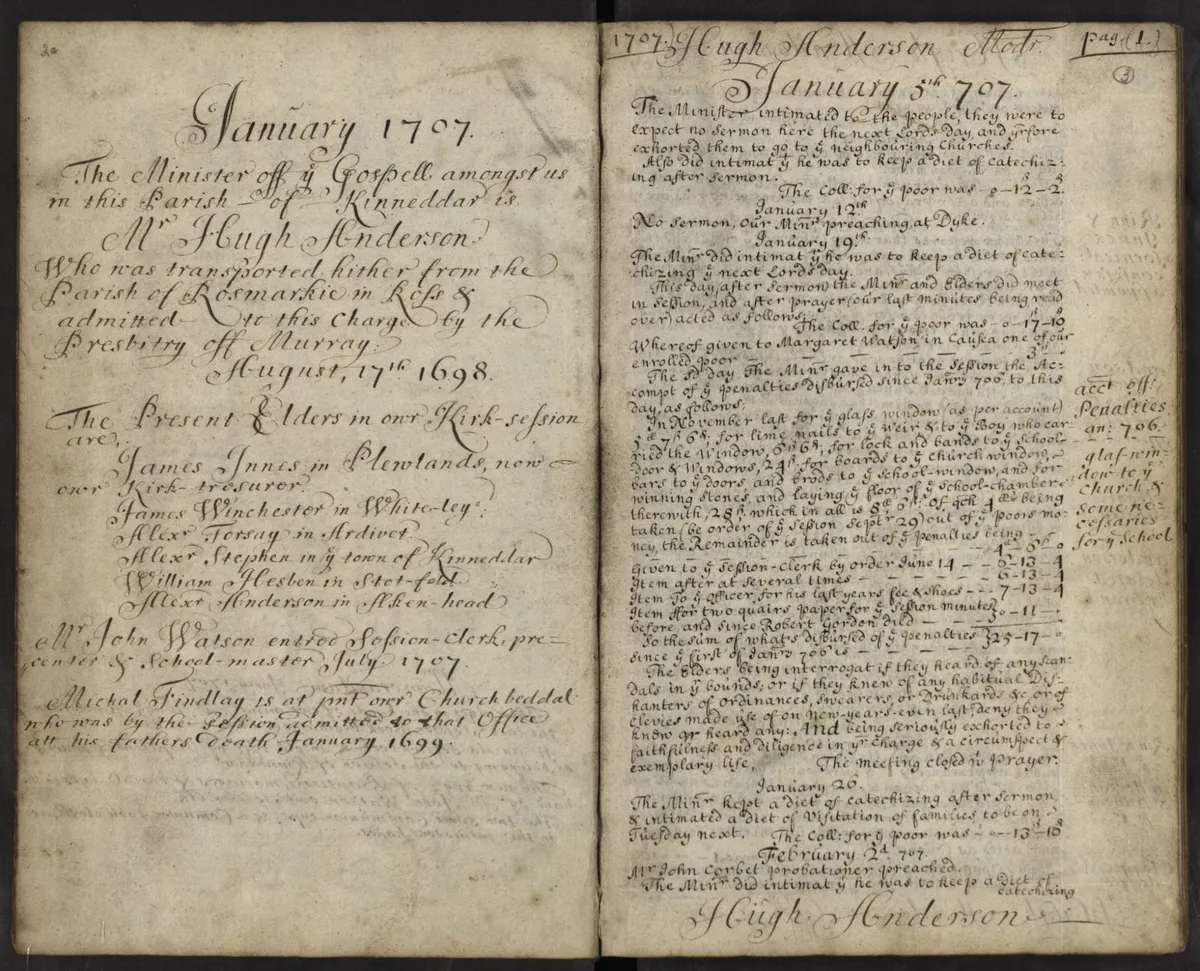What are Scottish kirk session records?
Kirk session records are generated from the activities of the Church of Scotland, or Kirk, and my include minute books and accounts. Kirk sessions are the lowest of the Church of Scotland courts. They can be a goldmine for Scottish ancestry research.
The Kirk emerged from the Reformation of 1560 as a presbyterian denomination, with its members calling ministers to serve them, and electing elders to look after their parochial affairs. The minister and elders would regularly meet as the kirk session, not only to discuss parish business but also to act as the congregation's ecclesiastical court.
Where can I find kirk session records?
The Edinburgh based National Records of Scotland hosts the biggest collection of Church of Scotland kirk session records. Many are now freely available to view on its ScotlandsPeople website, along with records of other courts such as the higher presbyteries and synods to which each parish belonged, and of many secession congregations. Although free to view through the site's Virtual Volumes tool, each page is watermarked with the ScotlandsPeople logo – it will cost two credits (50 pence) to download a clean copy of each page required. Further records will be released on the site in the future.
The records have not been indexed so you need to browse through records for the parishes where your ancestors lived and look for family names.
Many kirk session records have also been microfilmed by FamilySearch, which can be accessed by church members or at local family history centres. Records for some additional parishes and congregations are held at local archives across the country. Most have been digitised by the NRS, but some secession church registers still remain in the care of the parishes which created them.
What can kirk session records tell family historians?
The session's primary responsibility was to maintain discipline within the parish. Kirk session records therefore document investigations into a range of transgressions by parishioners, including minor disturbances of the peace, blasphemy, swearing, failure to observe the Sabbath, drunkenness, and anything else deemed to be against the 'common weil' of the congregation.
Members also handled a variety of other important functions, for example with the kirk session records noting regular payments to those in receipt of poor relief payments prior to the establishment of the Scottish Poor Law system in 1845. Accounts also record income from the payments of pledge money prior to the calling of banns for a marriage, and for use of the parish mortcloth to drape over a coffin, often the only record concerning a burial.
Kirk session records can also provide an insight into daily parish life, describing the appointments of new ministers and elders, communion days, the admission of members and the departures of others to new parishes, the calling of fast days, extreme weather events, the success or failure of harvests, political insurrection, and growing displeasure at social changes.
What are the most common cases found in kirk session records?
One of the most prosecuted 'crimes' found in kirk session records are acts of irregular marriage, where spouses married outside of the church by simply exchanging consent in front of witnesses without a celebrant, such as a church minister. Although perfectly legal in Scotland in the eyes of the State, the Kirk frowned heavily on such unions, which led to a loss of useful income from pledge money and proclamation money for banns. For a couple which married in this way to regain church privileges, such as baptism for their future children, they would have to face the discipline of the session. Happily for family historians this can provide much needed proof for their marriages, as a couple could not be convicted if they were not 'guilty' of the offence!
Kirk session records also document many cases involving 'antenuptial fornication', although the level of detail in such investigations varies from parish to parish. In many cases entire transcripts of interviews with witnesses are provided, often with salacious detail. If one or both parties were adulterers the consequence could be excommunication from the Kirk.
The session also investigated cases of illegitimate children, with a mother of a 'natural child' rigorously interrogated about its paternity. Whilst it was hard for a pregnant woman to hide her condition, a putative father could deny such allegations. In such cases kirk session records may note the case being referred to the next highest church court, the presbytery. If the putative father continued to deny his involvement here, he would ultimately be asked to swear an 'oath of purgation'. Failure to do so could also lead to excommunication.

What punishments do the kirk session records document?
If found guilty the kirk session records will note how convicted parishioners were to be punished, and when 'restored to discipline'. There were a range of possible sanctions, such as rebukes and fines in the session chambers, public humiliation in front of the congregation by being made to sit on a pentitent's stool and wearing sackcloth, and excommunication.
In some serious cases, or when parishioners failed to appear when summonsed, further referrals could be made to the civil courts.
